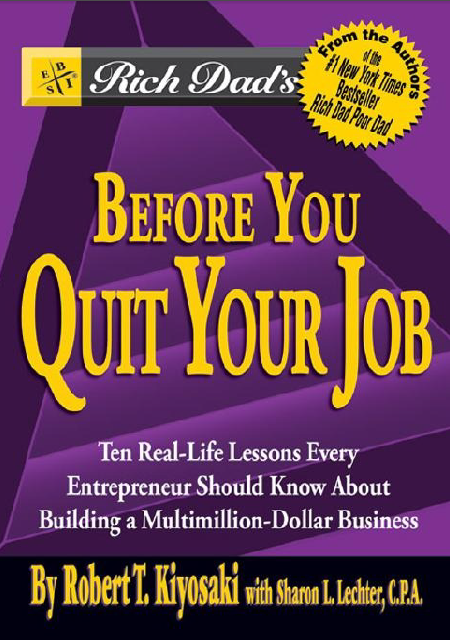Read more
Rich Dad's Before You Quit Your Job: 10 Real-Life Lessons Every Entrepreneur Should Know About Building a Multimillion-Dollar Business by Robert T. Kiyosaki with Sharon L. Lechter
Table of Contents
Introduction
Rich Dad’s Entrepreneurial Lesson
#1: A Successful Business Is Created Before There Is a Business.
Chapter 1: What Is the Difference
Between an Employee and an Entrepreneur?
Rich Dad’s Entrepreneurial Lesson
#2: Learn How to Turn Bad Luck Into Good Luck.
Chapter 2: Dumb and Dumber Gets
Rich and Richer
Rich Dad’s Entrepreneurial Lesson
#3: Know the Difference Between Your Job and Your Work.
Chapter 3: Why Work for Free?
Rich Dad’s Entrepreneurial Lesson
#4: Success Reveals Your Failures.
Chapter 4: Street Smarts versus
School Smarts
Rich Dad’s Entrepreneurial Lesson
#5: The Process Is More Important than the Goal.
Chapter 5: Money Talks
Rich Dad’s Entrepreneurial Lesson
#6: The Best Answers Are Found in Your Heart . . . Not Your Head.
Chapter 6: Three Kinds of
Money
Rich Dad’s Entrepreneurial Lesson # 7: The Scope of the Mission Determines the Product.
Chapter 7: How to Go from Small
Business to Big Business
Rich Dad’s Entrepreneurial Lesson #8: Design a Business That Can Do Something That No Other Business Can Do.
Chapter 8: What Is the Job of a
Business Leader?
Rich Dad’sEntreprenuerial Lesson
#9: Don’t Fight for the Bargain Basement.
Chapter 9: How to Find Good
Customers
Rich Dad’s Entrepreneurial Lesson
# 10: Know When to Quit.
Chapter 10: The Summary
Introduction
What Makes Entrepreneurs Different?
One of the most frightening days
of my life was the day I quit my job and officially became an entrepreneur. On
that day I knew there were no more steady paychecks, no more health insurance, or retirement plan. No more days off for being sick or paid vacations.
On that day, my income went to
zero. The terror of not having a steady paycheck was one of the most
frightening experiences I had ever experienced. Worst of all, I did not know
how long it would be before I would have another steady paycheck . . . it might
be years. The moment I quit my job I knew the real reason why many employees do
not become entrepreneurs. It is fear of not having any money . . . no
guaranteed income . . . no steady paycheck. Very few people can operate for
long periods of time without money. Entrepreneurs are different, and one of
those differences is the ability to operate sanely and intelligently without
money.
On that same day, my expenses
went up. As an entrepreneur, I had to rent an office, a parking stall, a
warehouse, buy a desk, a lamp, rent a phone, pay for travel, hotels, taxis,
meals, copies, pens, paper, staples, stationery, legal tablets, postage,
brochures, products, and even coffee for the office. I also had to hire a
secretary, an accountant, an attorney, a bookkeeper, a business insurance
agent, and even a janitorial service. These were all expenses my employer had
once paid for me. I began to realize how expensive it had been to hire me as an
employee. I realized that employees cost far more than the number of dollars
reflected in their paychecks.
So another difference between employees and entrepreneurs are that entrepreneurs need to know how to spend money, even if they have no money.
The Power of Excuses
Many people want to become
entrepreneurs but always have some excuse for why they do not quit their job,
excuses such as:
1. “I don’t have the money.”
2. “I can’t quit my job because I
have kids to support.”
3. “I don’t have any contacts.”
4. “I’m not smart enough.”
5. “I don’t have the time. I’m
too busy.”
6. “I can’t find anyone who wants
to help me.”
7. “It takes too long to build a
business.”
8. “I’m afraid. Building a
business is too risky for me.”
9. “I don’t like dealing with
employees.”
10. “I’m too old.”
The friend who gave this article by Professor Stevenson said, “Any two year- old is an expert at making excuses.” He also said, “The reason most people who want to become entrepreneurs remain employees is that they have some excuse that keeps them from quitting their job and taking that leap of faith. For many people, the power of their excuse is more powerful than their dreams.”
The Philosophy of an Entrepreneur
Becoming an entrepreneur began
with a change of philosophy. The day I left the Xerox Corporation in Puerto
Rico, my philosophy shifted from the philosophy of my poor dad to the
philosophy of my rich dad.
The shift looked like this:
1. From a desire for security to
a desire for freedom
2. From a desire for a steady
paycheck to the desire for great wealth
3. From seeing the value independence to seeing the value in independence
4. To make my own rules rather
than obey someone else’s rules
5. A desire to give orders rather
than take orders
6. A willingness to be fully
responsible rather than say, “It’s not my job”
7. To determine the culture of a
company rather than try to fit into someone else’s company culture
8. To make a difference in this
world rather than complain about the problems of the world
9. To know how to find a problem
and turn it into a business opportunity
10. To choose to be an entrepreneur rather than an employee
The Business Leader
The following is a rich dad’s list.
1. Clearly define the mission,
goals, and vision of the company.
2. Find the best people and forge
them into a team.
3. Strengthen the company on the
inside.
4. Expand the company on the
outside.
5. Improve the bottom line.
6. Invest in research and development.
7. Invest intangible assets.
8. Be a good corporate citizen.




0 Reviews